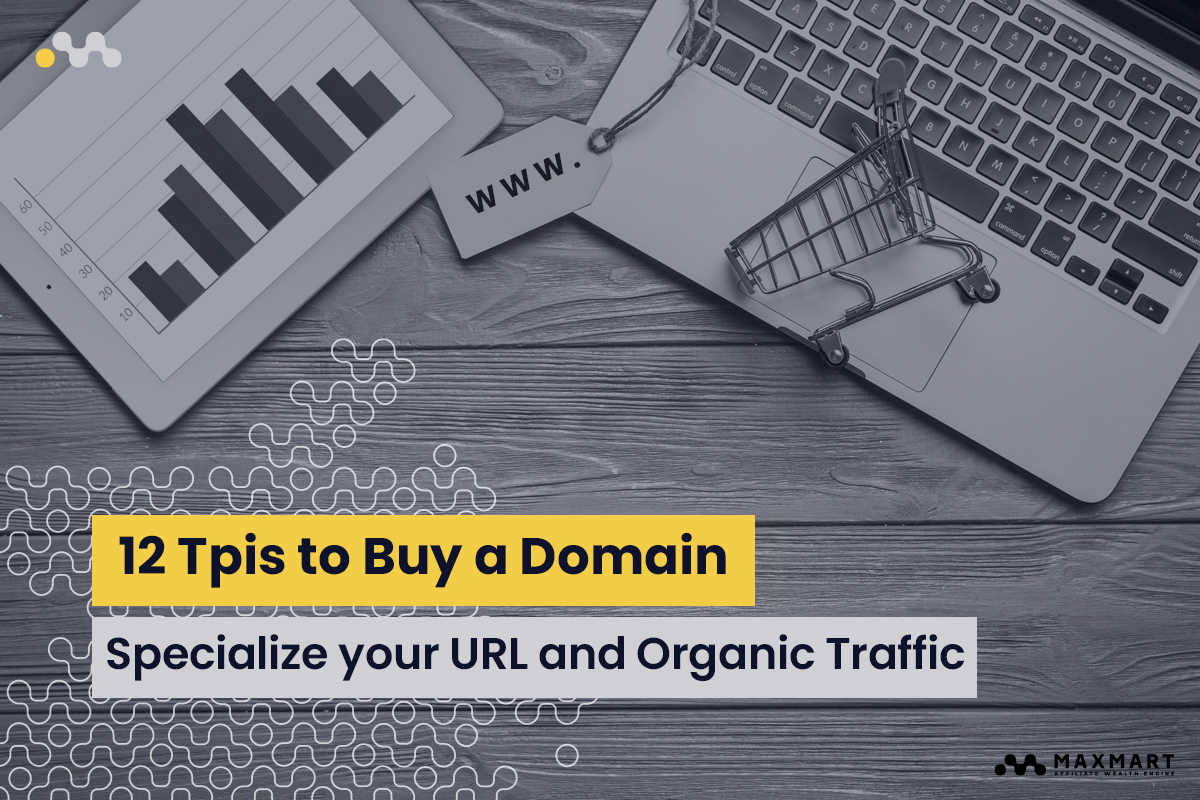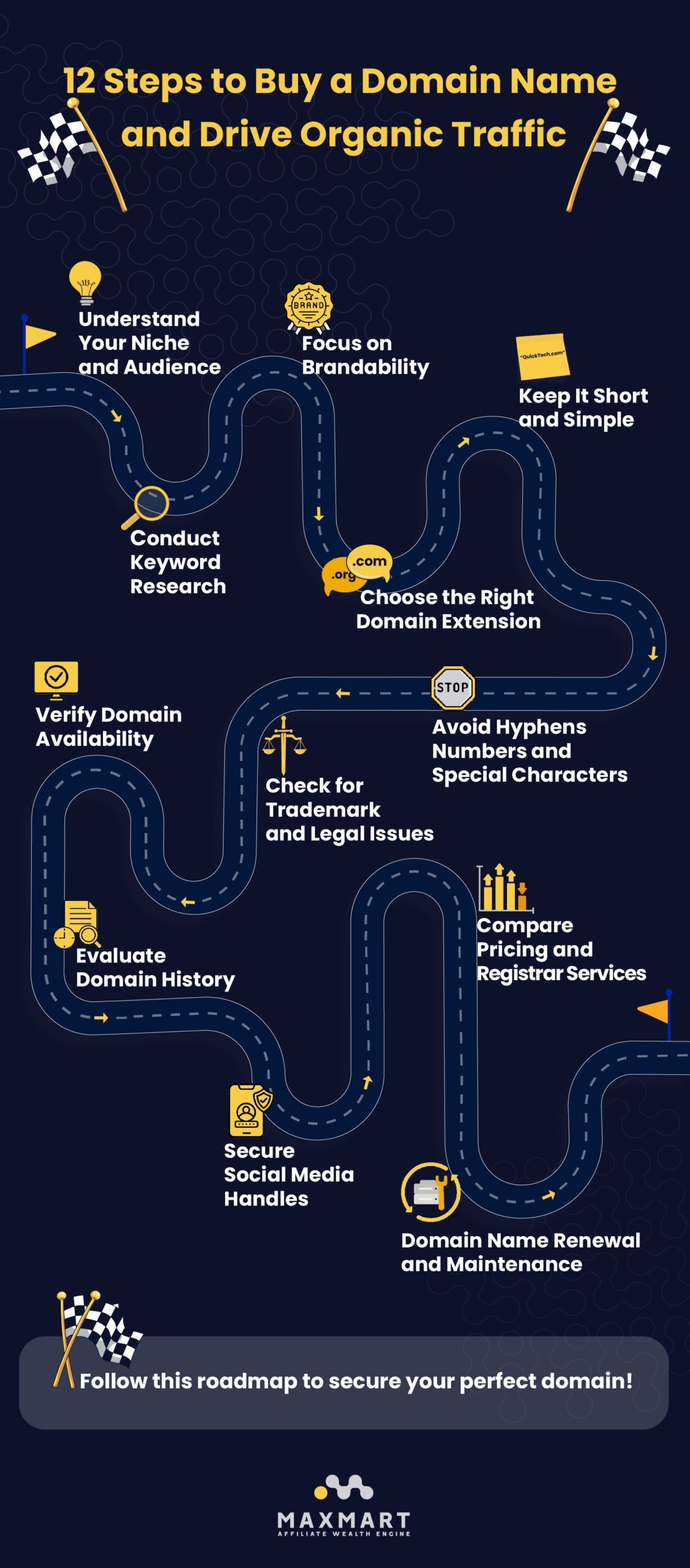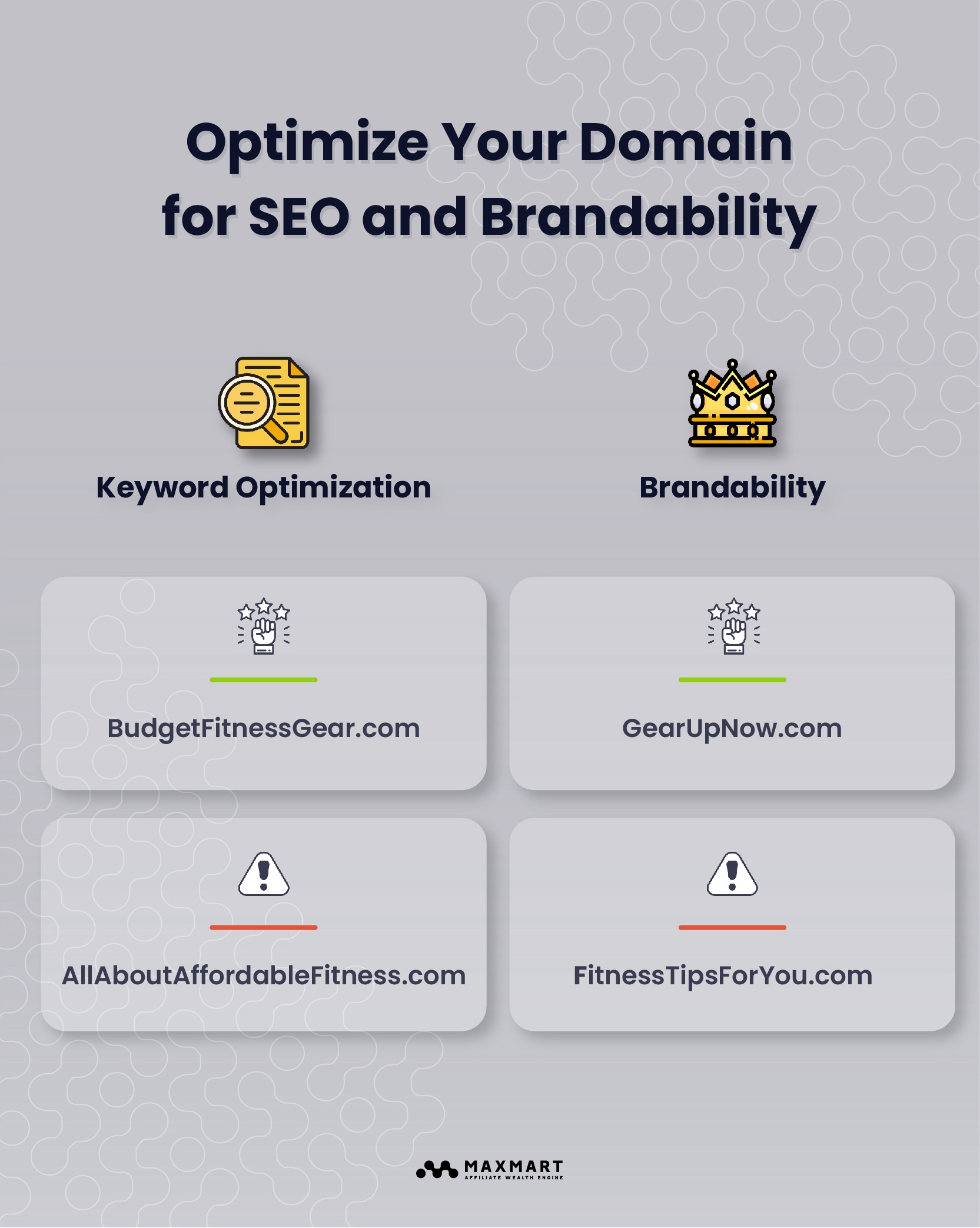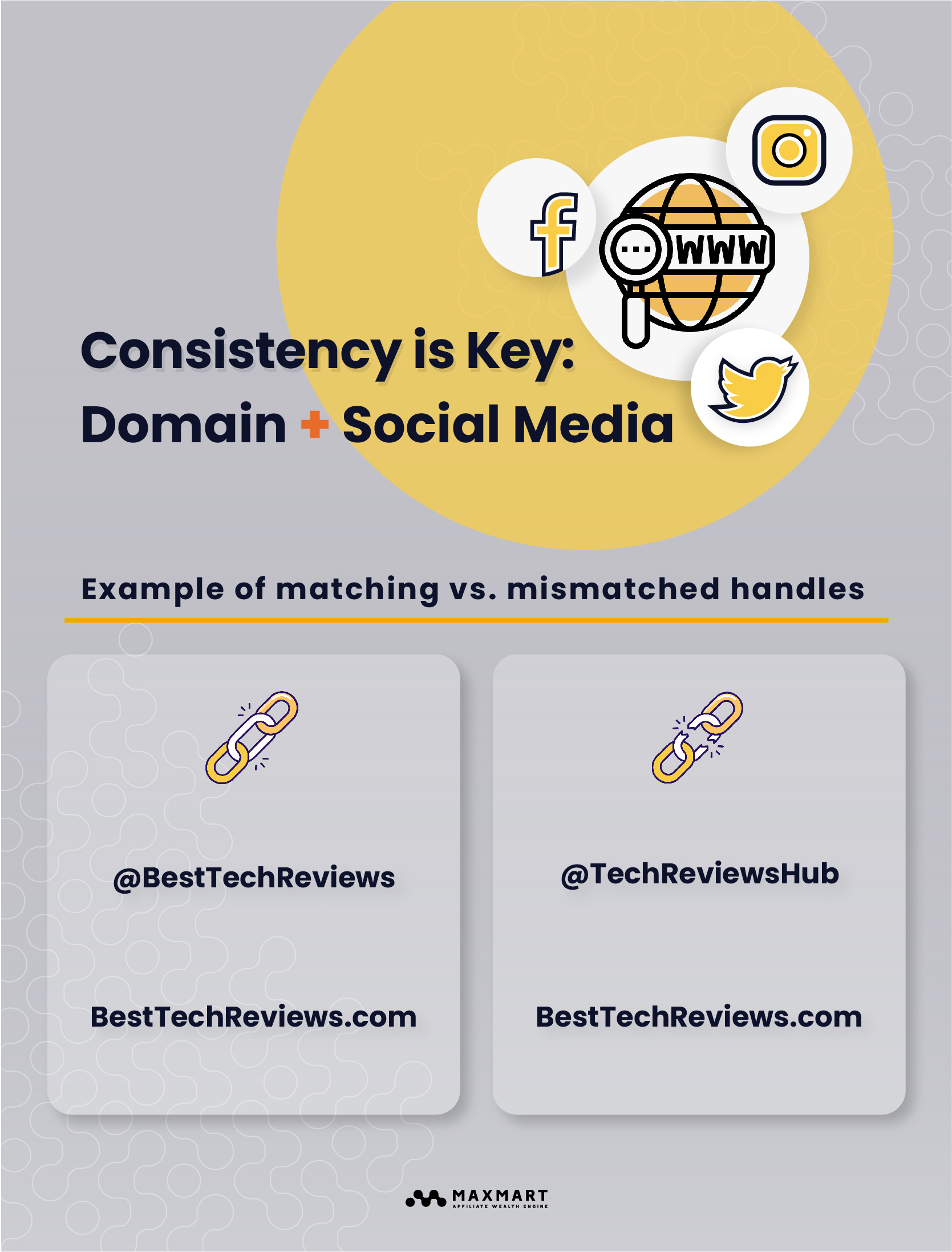
Building a successful affiliate website begins with one of the most crucial decisions you’ll make: choose and register domain names. Much like selecting the ideal storefront for a physical business, your domain name is your online address—your visitors’ first impression and the cornerstone of your brand identity.
When you carefully buy a domain name, not only will it resonate with your target audience but also plays a pivotal role in driving organic traffic to your site. From picking the right name to leveraging SEO-friendly practices, every step matters. This guide walks you through 12 essential steps, from brainstorming ideas to connecting your domain with hosting, ensuring that your affiliate website gets off to a strong start in both visibility and performance.

Step 1: Understand Your Niche and Audience
Your niche is the specific area of interest or expertise that your website will focus on. For affiliate marketers, this could range from fitness gear to tech gadgets or home improvement tools. A well-defined niche helps you create content that appeals to a specific audience, making your site more targeted and effective. If you’re unsure how to define your niche, we have a detailed article dedicated to this topic—be sure to check it out: What is Affiliate Niche; The Most Profitable Niches to Choose in 2024
Targeting the Right Audience
Your target audience is the group of people most likely to benefit from your content and offerings. Understanding their preferences, challenges, and expectations allows you to create content that directly addresses their needs. This connection fosters trust and engagement, two critical components for driving organic traffic and affiliate conversions.
Why Relevance to Your Niche Matters
Relevance is crucial when you buy a domain. A domain name that aligns with your niche, such as “BestFitnessGear.com” for a fitness-focused site, immediately signals to users and search engines what your site is about. Search engines reward relevant domains with better rankings, while visitors are more likely to trust a domain that feels tailored to their needs.
The Affiliate Advantage of a Niche-Focused Domain
For affiliate marketers, a niche-specific domain builds authority in your field. It sets clear expectations for visitors and positions you as an expert. This can drive more traffic and improve conversion rates, as visitors find your content more trustworthy and relevant. Before you buy a domain, take the time to define your niche and audience—it’s the foundation of your website’s success.
Step 2: Conduct Keyword Research
When you buy domain name, including relevant keywords in the name is one of the smartest strategies to boost your site’s visibility. Keywords tell search engines and users what your website is about. For affiliate marketers, having a keyword-rich domain name like “TopGadgetReviews.com” or “BudgetFitnessGear.com” can improve your chances of ranking higher for related search terms. This gives your site a competitive edge in organic search rankings and helps attract your target audience.
Tools for Effective Keyword Research
Before you settle on a domain name, conduct thorough keyword research. Free tools like Google Keyword Planner or premium tools like SEMrush and Ahrefs can provide valuable insights into search volume, competition, and related terms. For instance, if your affiliate website focuses on tech gadgets, a tool like SEMrush can reveal whether “tech reviews” or “best gadgets” are more frequently searched by your audience. This data ensures that the domain name you choose aligns with the terms potential visitors are actively searching for.
You can find some of the most effective keyword search tools of 2025 as part of our dedicated product review and find the option best suited to your needs.
Balancing Keyword Optimization with Readability
While keyword-rich domains are great for SEO, readability should never be sacrificed. A domain like “BestAffiliateMarketingTipsFor2024.com” might rank well but is overly long and hard to remember. Instead, aim for a clean balance, such as “SmartAffiliateTips.com”—keyword-optimized yet simple and memorable. This balance not only appeals to search engines but also ensures a better user experience, which is vital for keeping visitors engaged and driving conversions.
Step 3: Focus on Brandability
When you get a domain name, brandability is just as important as functionality. A brandable domain name is one that stands out, is easy to remember, and evokes a positive association with your site. For affiliate marketers, a unique and memorable domain name can help establish trust and make your site the go-to destination for your niche. Think of domain names like Amazon.com or Fitbit.com—they’re simple, distinct, and instantly recognizable.
Tips for Creating a Brandable Domain Name
To make your domain name align with your brand identity, focus on the following:
- Keep it Short and Simple: A concise domain name like “GearUpNow.com” is easier to remember and type than something overly complex.
- Use Easy-to-Spell Words: Avoid tricky spellings or made-up words that confuse visitors, like “phitness” instead of “fitness.”
- Incorporate Your Brand Tone: If your affiliate website is about high-end luxury products, the domain should feel premium, like “ElitePicks.com.” If it’s casual and fun, something playful like “SavvyDealsHub.com” works better.
- Check for Uniqueness: Ensure your domain isn’t too similar to an existing one. A near-identical domain can confuse visitors and hurt your brand credibility.
Examples of Highly Brandable Domain Names
Some of the most successful websites have achieved greatness due to their brandable domains. For instance:
- “BlueApron.com” for meal kits—simple, unique, and connected to their service.
- “NerdWallet.com” for personal finance advice—a clever play on words that aligns with their audience.
- “Healthline.com” for health-related content—straightforward yet authoritative.
Why Brandability Matters for Affiliate Marketers
For affiliate marketers, a brandable domain adds trustworthiness and professionalism to your site. When users feel your site is established and credible, they’re more likely to engage and convert. Before you buy a domain, consider not just how it ranks but also how it resonates with your audience and represents your brand identity. A brandable domain is an investment in your long-term success.

Step 4: Choose the Right Domain Extension
When you buy a domain, the extension you choose can significantly impact your site’s perception and performance. The most common extension, .com, is widely recognized and trusted, making it the default choice for most websites. It’s ideal for affiliate marketers who want to attract a global audience and establish credibility. However, its popularity means many .com domains are already taken, which can make finding the perfect name challenging.
Other popular extensions include .org and .net. .org is often used by nonprofits or organizations with an educational or community focus, while .net is generally associated with tech or network services. While these alternatives are legitimate, they don’t carry the same universal trust as .com, which could impact your site’s credibility with users.
When to Consider Niche or Country-Specific Extensions
In some cases, niche or country-specific extensions can be beneficial. If your affiliate site targets a specific industry, extensions like .tech (for technology) or .shop (for e-commerce) can make your domain name more relevant. Similarly, if your audience is region-specific, a country-code extension like .co.uk or .ca may help. For example, a UK-based affiliate site promoting local deals might benefit from “GreatDeals.co.uk” as it builds trust with local users.
However, niche and regional extensions may limit your audience if you plan to expand globally. They can also appear less professional if they aren’t commonly recognized by users.
The Impact of Domain Extensions on SEO and User Trust
Domain extensions directly affect user trust and SEO. Search engines do not inherently prioritize one extension over another, but .com domains are often viewed as more authoritative by users, leading to higher click-through rates. On the other hand, extensions like .biz or .info can appear spammy, which may deter users and hurt conversions.
When you buy a domain, aim for an extension that aligns with your goals, audience, and brand identity. Whether it’s a universally trusted .com or a niche-specific .tech, the right choice can enhance your website’s visibility, trustworthiness, and long-term success.
Step 5: Keep It Short and Simple
When you buy a domain, one of the best strategies is to keep the name short and simple. Concise domain names are easier to remember, type, and share, which makes them highly effective for building brand recognition and driving traffic.
For example, domains like “ShopSavvy.com” or “QuickTech.com” are intuitive and stick in the mind of users. A shorter name reduces the chances of errors when users type it into their browser, which can help you avoid losing potential visitors.
Short domains are especially beneficial for affiliate marketers, who often rely on repeat traffic. If your audience can quickly recall your site’s name, they’re more likely to return or recommend it to others, boosting your organic reach.
Avoiding Complexity
Long, complex domain names can hurt your site’s engagement and traffic. A name like “TheBestDiscountedTechAndGadgetDeals.com” may describe your site’s purpose but is cumbersome to remember, type, or share. Such domains are more prone to typos, which can lead to frustrated users landing on error pages—or worse, competitor sites with simpler names.
Complexity can also make your domain less visually appealing. When people see a long domain in search results or social media, it may seem unprofessional or overwhelming. Instead, a clean, simple domain like “TechDealsHub.com” conveys the same purpose but is much easier for users to process.
The Power of Simplicity for Affiliate Marketing
For affiliate marketers, simplicity is crucial. Many users will discover your site through links or referrals, so a straightforward domain improves recall and click-through rates. Before you buy a domain, brainstorm options that are concise, easy to spell, and memorable. A short, simple name not only enhances your brand’s usability but also sets the stage for better engagement and long-term growth.
Step 6. Avoid Hyphens, Numbers, and Special Characters
When you buy a domain, avoiding hyphens, numbers, and special characters is critical for readability and trust. Domains like “Top-Deals4U.com” may seem creative, but they often confuse users and look less professional. Hyphens can make your domain harder to type, and numbers often lead to ambiguity—does “4” mean the numeral or the word “four”? Special characters are even more problematic, as they are unsupported in many cases and make the domain appear untrustworthy.
A clean, character-free domain is easier for users to remember, type, and share. In affiliate marketing, where trust is essential for conversions, domains with unusual elements can appear spammy or low-quality, driving potential visitors away.
How These Elements Impact SEO
Hyphens, numbers, and special characters can also harm your site’s SEO. Search engines prioritize domains that are straightforward and user-friendly. A name like “Best-Gadgets.com” may rank lower than “BestGadgets.com” because hyphens can disrupt the perceived natural flow of the name. Moreover, complicated domains often have lower click-through rates, which can signal to search engines that your site is less valuable to users.
Examples of Good vs. Problematic Domain Names
- Good Examples:
- “SmartDealsHub.com”
- “TechReviewsPro.com”
- “QuickFitnessTips.com”
- Problematic Examples:
- “Smart-Deals-4U.com” (Hyphens and numbers make it harder to type and trust.)
- “Best@Tech.com” (Special character is unsupported and unprofessional.)
- “123FitnessGear.com” (Numbers create ambiguity and reduce readability.)
Why Simplicity Matters in Affiliate Marketing
For affiliate marketers, a clean and simple domain fosters trust and encourages users to click links, boosting organic traffic. Before you buy a domain, ensure it is free from unnecessary symbols, numbers, or characters. Simplicity not only improves usability and SEO but also strengthens your brand’s credibility and appeal.
Step 7: Check for Trademark and Legal Issues
Before you buy a domain, it’s vital to ensure that the name you’ve chosen doesn’t infringe on any existing trademarks. Trademark infringement can lead to legal disputes, which may result in losing the domain or facing costly penalties. To avoid this, research your desired domain name thoroughly to confirm it isn’t already legally protected by another entity.
Start by searching trademark databases like the United States Patent and Trademark Office (USPTO) or equivalent agencies in your region. Look for exact matches or similar names that could create confusion. For example, registering “TechReviewsHub.com” would likely be fine, but “AppleGadgetReviews.com” could cause issues due to the trademarked name “Apple.”
Tools and Resources for Trademark Checks
Several tools and resources can help you identify potential trademark conflicts:
- USPTO Trademark Database: Check if your domain name is already registered as a trademark in the U.S.
- World Intellectual Property Organization (WIPO): Useful for international checks.
- Legal Counsel or Trademark Attorney: If your domain name feels close to an existing brand, consult a professional to assess the risk.
Additionally, check social media platforms and existing websites to ensure your domain doesn’t overlap with another brand’s online presence.
Consequences of Choosing a Domain with Legal Issues
Choosing a domain that infringes on trademarks can have serious consequences. At best, you may be required to surrender the domain, losing all the effort you’ve put into building your website. At worst, you could face lawsuits and financial penalties, which are particularly damaging for affiliate marketers just starting out.
Legal disputes also harm your reputation and SEO rankings, as search engines may delist a site involved in trademark issues. To avoid these pitfalls, conduct thorough research before you buy a domain. Taking the time to verify its legal status protects your investment and sets your site up for long-term success.
Step 8: Verify Domain Availability
Before you buy a domain, the first step is to check if it’s available for registration. Many domain names, especially shorter or keyword-rich ones, are already taken, but reliable tools make the process of checking availability quick and easy. Here are some popular platforms for domain searches:
- GoDaddy: A widely used platform for searching and purchasing domains. It also suggests alternatives if your desired name is taken.
- Namecheap: Known for its affordability and cheap domain options, Namecheap allows you to search for available domains and compare prices across various extensions.
- Domain.com: A simple and intuitive tool that helps you find available domains and register them with ease.
- Google Domains: Offers a clean interface for searching domains and often integrates with other Google services.
Most of these platforms also provide filters to help you explore domain variations, extensions, and pricing options.
These tools, alongside other credible options, were reviewed as part of our best tools to check domain availability in 2024, which you can read and find the best option for your needs!
Alternatives if Your Desired Domain Is Taken
If the domain you want is unavailable, don’t panic—there are several options to explore:
- Negotiate with the Current Owner:
Many registered domains are not actively used, and their owners may be willing to sell. Platforms like Sedo and Afternic specialize in domain resale, allowing you to contact owners and negotiate a price. While this can be expensive, it’s worth considering if the domain is critical to your brand. You can find more of these best domain broker options as part of our product review on the matter. - Brainstorm Variations:
Modify your desired name slightly to create a unique version. For example, if “BestTechReviews.com” is taken, consider variations like “TopTechReviews.com” or “TechReviewPro.com.” You can also experiment with different extensions, such as .net or .io, though .com is often the preferred choice. - Use Domain Generators:
Tools like Lean Domain Search or Panabee can help generate creative alternatives by combining your keywords with other relevant terms. - Think Local or Niche-Specific Extensions:
If your audience is location-specific or industry-focused, consider extensions like .co.uk, .tech, or .shop to find a name that resonates with your target market.
Why Checking Availability Matters
Securing the right domain is a critical step in establishing your brand identity and credibility. By using the right tools and considering alternatives when necessary, you can ensure your chosen name aligns with your goals. A thorough search before you buy website domain prevents complications and positions your site for success.
Step: 9. Evaluate Domain History
When you buy a domain, especially one that has been previously owned, it’s essential to evaluate its history. A domain’s past can significantly impact your website’s SEO performance, reputation, and credibility. For example, if the domain was previously associated with spammy or malicious content, search engines may penalize it, making it harder for you to rank. Similarly, a domain tied to controversial or irrelevant content can deter potential visitors and harm your brand’s trustworthiness.
On the other hand, a domain with a clean, positive history might bring benefits such as existing backlinks or residual traffic. This is especially useful for affiliate marketers, as a good reputation can accelerate your journey to driving organic traffic.
Tools to Research Domain History
To ensure you’re making an informed decision, use the following tools to research the history of a domain:
- Wayback Machine (Archive.org): This tool allows you to view snapshots of a domain’s previous websites, giving you insight into how it was used in the past. Check for any questionable or irrelevant content that might harm your brand.
- WHOIS Lookup: Tools like WHOIS.net provide information about the domain’s previous owners, registration dates, and expiration records. This can help identify if the domain has changed hands frequently, which could be a red flag.
- Google Search and Backlink Checkers: Search the domain name on Google to see if it’s mentioned in any negative contexts. Use tools like Ahrefs or SEMrush to analyze its backlink profile—spammy links can harm your SEO efforts.
How Past Usage Can Impact SEO and Reputation
A domain’s history can directly influence your website’s search engine performance. If the domain has been penalized in the past, it may take significant effort to recover its standing. Additionally, residual negative associations—such as links to harmful content—can deter users from trusting your site.
For affiliate marketers, reputation is everything. Starting with a clean domain ensures your efforts to drive organic traffic aren’t undermined by past issues. Before you purchase domain name, thoroughly evaluate its history to avoid unexpected setbacks and build a strong foundation for your website’s success.
Step 10: Secure Social Media Handles
When you purchase domain name, it’s equally important to secure matching social media handles to ensure consistent branding across all platforms. Consistency reinforces your brand identity, making it easier for your audience to recognize and engage with your affiliate site. For example, if your domain is “BestTechReviews.com”, having social media handles like @BestTechReviews on Twitter, Instagram, and Facebook strengthens your presence and avoids confusion.
In affiliate marketing, a cohesive online identity builds trust and professionalism, which are critical for attracting and retaining visitors. Mismatched handles or unavailable names can dilute your brand and make it harder for users to find and follow you across channels.
Tools to Check Handle Availability
Checking the availability of social media handles early in the process can save you from headaches later. Use these tools to streamline the process:
- Namechk: This tool lets you search your desired handle across multiple platforms at once, including Twitter, Instagram, Facebook, and YouTube.
- Knowem: Similar to Namechk, this tool also checks trademark databases to ensure the handle is free from legal conflicts.
- Individual Platform Searches: If you prefer, you can manually search platforms like Twitter, Instagram, and Facebook to verify availability.
After confirming availability, register the handles immediately—even if you don’t plan to use them all right away. Securing your brand name on major platforms prevents competitors from taking them and helps you maintain control of your online identity.
Why Consistency Across Domain and Social Media Matters
In today’s digital landscape, your domain and social media profiles are interconnected. Affiliate marketers often use social media to promote their content, so having matching handles makes it easier for users to connect with your brand. Inconsistent or unavailable handles can confuse users and lead to lost traffic.
When you buy a domain, think beyond the website itself—consider your entire digital ecosystem. By securing matching social media handles, you lay the groundwork for a cohesive and trustworthy brand that stands out in the competitive world of affiliate marketing.

Step 11: Compare Pricing and Registrar Services
When you’re ready to buy a domain, selecting the right registrar is just as important as choosing the name itself. A domain registrar is the service provider that registers your domain and ensures it’s connected to the internet. Reputable registrars offer transparency, competitive pricing, and reliable customer support. Look for providers with strong industry reputations, such as GoDaddy, Namecheap, or Google Domains. For an in-depth comparison of domain buying sites, refer to our dedicated article on this topic.
Avoid registrars with overly cheap introductory prices, as they may include hidden charges or steep renewal fees. Reliability and customer service matter more than saving a few dollars upfront.
Evaluating Registration, Domain Name Cost, Renewal Fees, and Hidden Charges
Domain prices vary widely, depending on the provider, the domain extension, and any additional services. Some registrars offer attractive introductory prices, but their renewal rates can be significantly higher. For example, a domain might cost $9.99 for the first year but jump to $25 or more upon renewal.
Be mindful of hidden charges, such as fees for transferring your domain to another registrar or charges for features like privacy protection. Transparency is key—always read the fine print before committing. Our article on domain expiry tools provides insights into the best options for managing renewals and avoiding costly lapses.
Features to Look For: Privacy Protection, Support, and Add-Ons
Beyond pricing, consider the features offered by the registrar:
- Privacy Protection: Many registrars include this feature for free or at a nominal fee. It hides your personal information (name, email, phone) from public WHOIS databases, protecting you from spam and potential scams.
- Customer Support: A registrar with 24/7 support can be invaluable if you encounter technical issues or have questions about your domain.
- Add-Ons: Some registrars offer helpful extras like free email forwarding, DNS management tools, or bundled hosting services.
Why Comparing Services Matters for Affiliate Marketing
For affiliate marketers, selecting a reliable registrar ensures your domain is secure and easy to manage. Hidden fees or poor support can disrupt your operations, affecting your ability to drive traffic and earn revenue. Before you buy a domain, take the time to evaluate pricing, features, and service quality. A thoughtful decision upfront will save you time, money, and frustration in the long run.
Step 12: Domain Name Renewal and Maintenance
When you buy a domain, your responsibility doesn’t end with registration. Renewing your domain on time is crucial to avoid losing ownership. Domains typically require annual renewal, but many registrars offer multi-year plans or automatic renewal options. Automatic renewal is a simple way to ensure you don’t accidentally let your domain expire, which can disrupt your affiliate marketing efforts or allow competitors to snatch it up.
Additionally, keep payment methods linked to your registrar account up to date. An expired credit card could cause a renewal failure, putting your domain at risk.
Importance of Monitoring Domain Expiration Notifications
Registrars send expiration reminders well in advance of your domain’s renewal date, usually via email. Pay close attention to these notifications, as they serve as a safeguard against losing your domain. A domain expiration doesn’t just affect your website—it can harm SEO rankings, result in lost backlinks, and damage your affiliate business’s credibility.
For added peace of mind, consider using tools like domain monitoring services or apps that track expiration dates and send alerts. Many registrars also allow you to lock in discounted rates for long-term renewals, reducing the stress of annual reminders.
How to Prevent Unauthorized Domain Transfers
Unauthorized domain transfers are rare but can have devastating consequences. To protect your domain:
- Enable Domain Lock: Most registrars offer this feature, which prevents your domain from being transferred without your explicit approval.
- Use Strong Account Security: Ensure your registrar account is protected with a strong password and two-factor authentication.
- Monitor WHOIS Information: Regularly check that your domain’s contact information hasn’t been tampered with, as outdated details can make it easier for bad actors to take control.
Why Renewal and Maintenance Matter for Affiliate Marketing
For affiliate marketers, a domain is your brand’s home base. Losing it due to missed renewals or unauthorized transfers can result in lost traffic, revenue, and trust. By staying proactive about domain maintenance, you safeguard your investment and ensure uninterrupted operations for your affiliate website. Always prioritize renewal and security when you buy a domain to keep your site thriving long-term.
Conclusion
Choosing and securing the right domain is one of the most important steps in building a successful affiliate website. From understanding your niche to evaluating domain history, we’ve covered the 12 critical steps to help you confidently buy a domain and drive organic traffic. Ensuring brand consistency, protecting your domain, and utilizing the right tools for maintenance and SEO all play pivotal roles in creating a meaningful online presence.
At MaxMart, we are committed to empowering you with the tools and knowledge needed to thrive in the digital world. From domain-buying tips to comprehensive resources on website building, SEO strategies, and traffic-driving tools, we’re here to help you every step of the way. Explore our articles, guides, and tools to unlock the potential of your online presence and achieve your goals.

